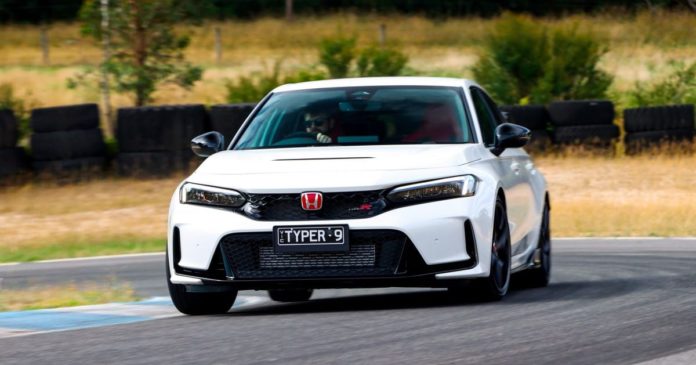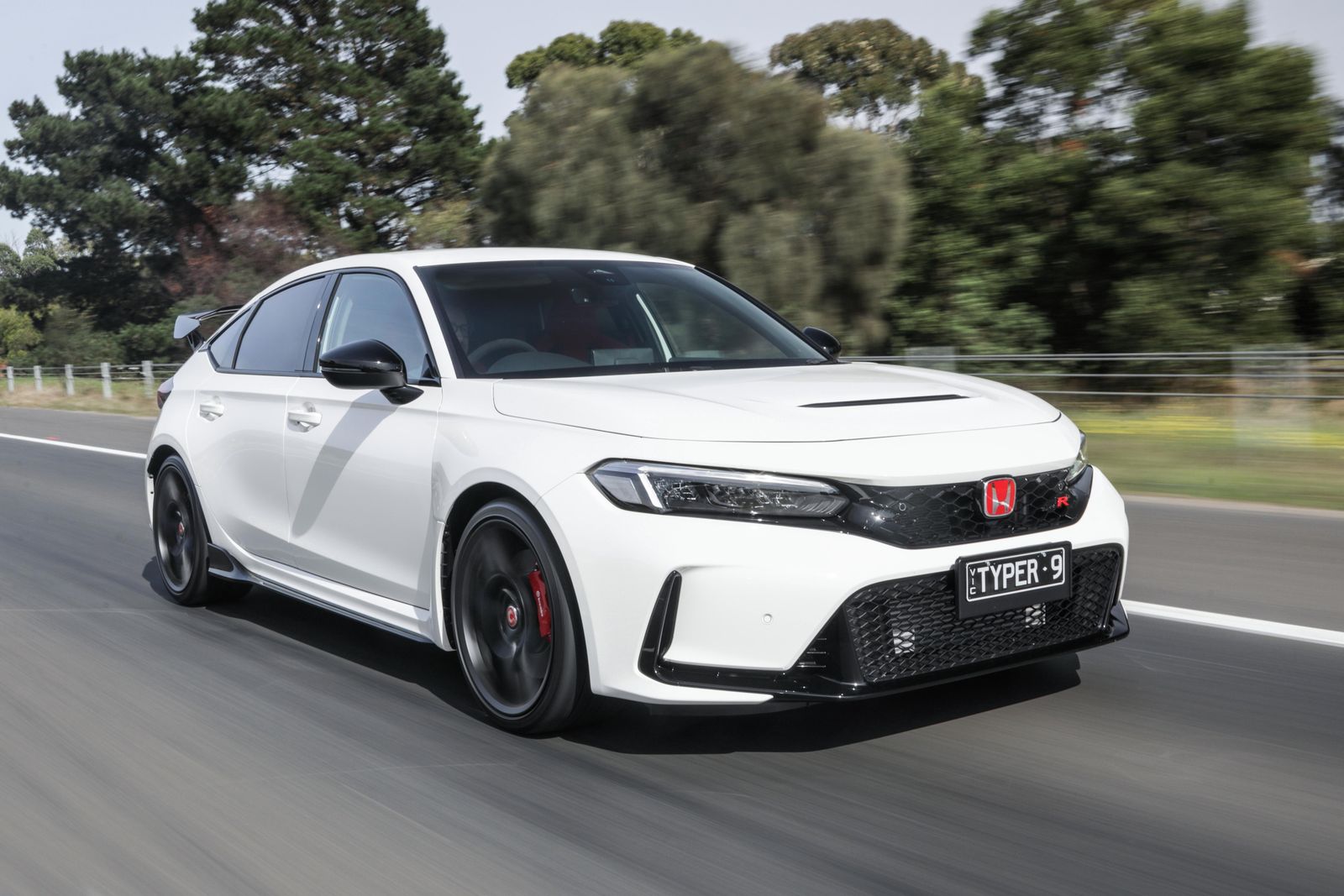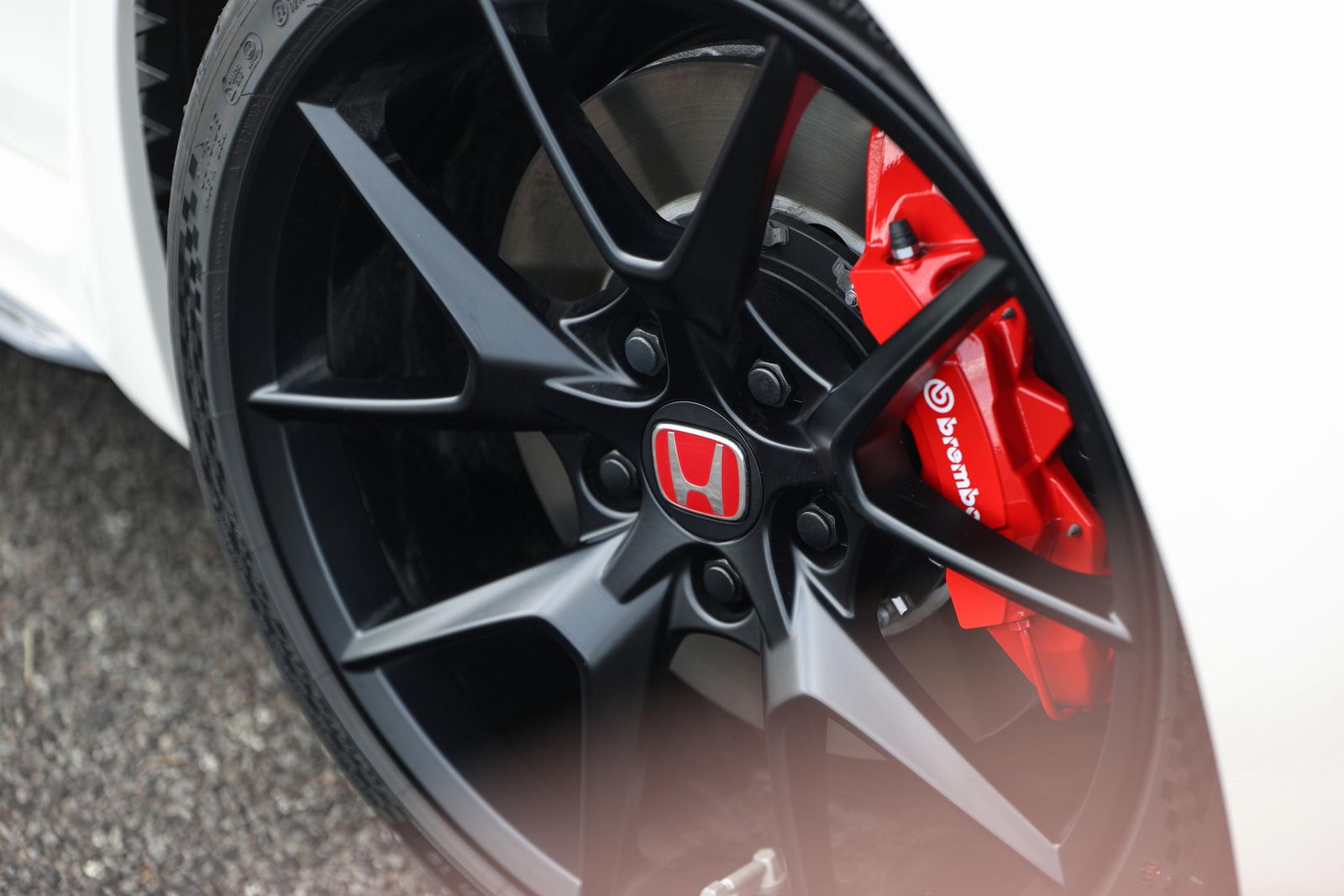The Honda Civic Type R has reached cult status of late.
In previous-generation Type R was a return to form for Honda, with wild pace and dynamics to match its equally wild looks.
While the storied FK8 won the hearts of owners, fans and many journalists, I was pretty underwhelmed every time I drove it.
It wasn’t the wacky styling or the performance, but driving daily it just didn’t have the character to go with the looks. There wasn’t a lot of noise, the cabin tech was average towards the end of its life… it just didn’t do it for me.
In fairness, on the odd occasion you really got to send it through a winding road, or a race track, it was nigh on peerless. But that was really the only arena where the FK8 Type R won my heart.
Now, there’s a new one hitting Honda Centres. Dubbed ‘FL5’, the 2023 Honda Civic Type R appears to be a more refined take on its predecessor, with cleaner lines and newer tech to go with its even more aggressive mechanicals.
I mean, just look at it. My mind immediately goes to GT3 or TCR racer for the road, the people’s Porsche 911 GT3 if you will.
But you’ll pay for the privilege. At $72,600 drive-away the new Civic Type R is some $10,000 more than its predecessor, and is firmly in the territory of all-wheel drive hot hatches like the Audi S3 and Volkswagen Golf R.
Plus, last we checked the new Type R has a waiting list stretching 20 months and counting, so even if you were to order one today you might not take delivery until the second half of 2024 – is it worth the wait?
How much does the Honda Civic Type R cost?
The Type R launches with nationwide pricing of $72,600 drive-away.
For reference, the British-made FK8 retailed for $54,990 before on-road costs, which would have translated to the low $60,000 bracket after taxes. The new one is more than $10,000 dearer.
Then there’s the ever-growing wait times which, when we checked last at the end of January stretch past 20 months. It’s a very long time for something that isn’t a brand new Ferrari or Lamborghini, or a Porsche GT car.
Key rivals include the Toyota GR Corolla GTS ($62,300) and Volkswagen Golf R ($66,990), which are similarly priced to the Type R on drive-away pricing. Both feature all-wheel drive as standard. Keep in mind the GR Corolla is limited to 500 units in 2023, and the Golf R Hatch is incredibly supply constrained.
At this end of the market you can also consider the Audi S3 Sportback ($71,800), Cupra Leon VZx ($63,990 drive-away) or Renault Megane R.S. Trophy ($63,500). Want something even more special? The Audi RS3 Sportback ($91,400) and Mercedes-AMG A45 S ($106,900) are arguably on the same level of crazy.
Once you consider other options in market, the Civic Type R shapes as relatively good value…
2023 Honda Civic pricing:
- Honda Civic VTi LX: $47,200
- Honda Civic e:HEV LX: $55,000
- Honda Civic Type R: $72,600
Prices are drive-away
What is the Honda Civic Type R like on the inside?
Very red… and very suede-y…
Honda has gone to a lot of effort to make the Type R’s interior feel special compared to the VTi LX and e:HEV LX, even if the overall design and layout is largely the same.
The seats and steering wheel are trimmed in lovely suede, with the seats and carpets coloured an eye-popping shade of red to match Type Rs of old as well as the iconic red ‘H’ logo used on Honda performance products.
Ahead of the front passenger is a Type R build plaque on the dashboard, which is a nice touch, while the aluminium shifter and silver metal-look trim ornamentation again distinguish it from lesser Civic models.
Like the rest of the Japanese-built Civic range, build quality in the Type R feels very solid. There’s a good mix of soft-touch and harder, textured surfaces, and everything feels tightly screwed together.
Even better, all the touch points feel wonderful in the Type R. Take the suede-trimmed steering wheel with contrast stitching, the solid aluminium shift knob, the soft but figure-hugging red sports seats, the matching red seatbelts, as well as suede accents for the centre armrest and elbow rests in the doors.
Everything operates with a bit of class, too. The switchgear clicks reassuringly when you press a button or flick a toggle, and the knurled dials for the climate controls have a satisfying, Audi-like clicking action as well. Top notch.
There’s an attention to detail at play here that really elevates the cabin in Type R specification. Compare that to something like a Golf R, which is very similar to an R-Line in most ways inside, the Type R feels more purpose-built.
As a result, the cabin has a sporty ambience that’s clearly race or track-inspired but maintains the creature comforts and in-car technologies that are required of a car that’s likely to be daily driven.
Speaking of, the Type R scores a 9.0-inch touchscreen navigation system with Honda Connect services shared with the Civic e:HEV, rather than the non-telematics-equipped version in the VTi LX.
Headlining the unit’s feature list are embedded navigation, wireless Apple CarPlay, wired Android Auto with Google Assist, Bluetooth phone and audio streaming, AM/FM/DAB+ radio, as well as compatibility with over-the-air (OTA) map and software updates.
The Type R also gets the company’s LogR 2.0 data logger offering a Performance Monitor, a lap time recorder for race tracks, as well as real-time readouts for the temperatures and pressures of various systems including coolant, engine oil and intake air.
Like other telematics-based infotainment platforms, Honda Connect offers a smartphone app, incorporating convenience and safety functions. A five-year subscription is included with purchase. More on that below.
Nothing tells you more that the Civic Type R focuses on the driver more than the rear seat, which gets blacked-out seat trim and a two-seat bench instead of the usual three-seat arrangement of the regular Civic.
Forward visibility for rear passengers is compromised compared to non-Type R models due to the bulky seatbacks of the front rear, but otherwise you get the same ample accommodation if you want to take friends along with you for a speedy hillclimb.
The lack of a centre seat makes this feel a little bit like a HR-V (…kidding!) but the cupholders that would usually be incorporated with the removed fold-down centre armrest are now mounted where the middle seat would normally be.
Other amenities include bottle holders in the doors and the requisite ISOFIX and top-tether points for child seats, but there are no air vents or map pockets behind the front seats. The red carpet is just as cool in the back as it in the front in my eyes, though.
Despite its performance and race track focus, the Type R isn’t the least practical Civic in terms of load-lugging capacity.
With 410L of boot behind the second row of seats, and up to 1212L with the rear seats folded (to the roof), the Type R bests the e:HEV hybrid by 1L and 35L in each respective measurement.
There is no spare wheel under the boot floor, with all Civic models in Australia featuring a tyre repair kit.
If you want a fast compact car with the most practicality possible for the kids and the dog, you’re perhaps better off with something like a Volkswagen Golf R Wagon – though I doubt most Type R buyers are cross-shopping the two.
What’s under the bonnet?
A revised 2.0-litre turbocharged four-cylinder VTEC petrol engine lives here, which outputs 235kW (6500rpm) and 420Nm (2600-4000rpm).
Drive is sent to the front axle via a slick-shifting six-speed manual transmission and helical-type limited-slip differential – which never locks the speed of the two driving wheels together like a locking diff.
“[It] instead allows different wheel speeds to accommodate the longer distance the outer wheel must travel when cornering. This component enables the vehicle to accelerate harder on surfaces with uneven traction,” Honda says.
Honda claims a 0-100km/h sprint in just 5.4 seconds, while top speed is 275km/h. The previous-generation Type R put out 228kW and 400Nm from its 2.0-litre VTEC Turbo, and took 5.8 seconds to hit triple figures.
While there the powertrain upgrades seem nominal on paper, a number of developments under the skin should ensure the new Civic Type R is not only faster in a straight line, but sharper around corners.
The turbocharger housing is now smaller and more efficient by 3.0 per cent thanks to changes to the shape and the number of the blades, which has also reduced inertia by 14 per cent.
There’s a wider exhaust intake with 10 per cent more airflow, and improvements to the intercooler which result in reduced pressure loss. The exhaust itself is straight through with a 13 per cent gain in exhaust flow, to provide quicker engine response.
In the six-speed manual transmission there’s a lighter flywheel and revised rev-matching system, which delivers quicker downshifts. As is Type R tradition, the shift knob is finished in solid aluminium. Ooft…
Honda claims the new Type R is sharp as ever thanks to its dual-axis front suspension, which features aluminium knuckles, strut forks and lower arms. Wider tyres and wheels improve mechanical grip, with sticky 265/30 R19 Michelin Pilot Sport 4S rubber wrapped around the new forged alloy wheels.
The brake boosters have also been retuned for improved feel and control, while the two-piece front rotors get better cooling thanks to increased airflow through the front bumper and split-spoke wheel design. Speaking of the brakes, they’re 350mm ventilated units up front with four-piston aluminium calipers supplied by Brembo.
Let’s see how that all comes together on the road… shall we?
How does the Honda Civic Type R drive?
There was never a doubt that the regular Civic was one of the best small cars to drive, but this Type R… wow.
It’s as if the staggered releases of the VTi and e:HEV versions were building up to this pièce de résistance; it feels like a race car as soon as you get behind the wheel and press that glowing red starter button.
The engine noise is more prominent right from the get-go, even if it’s augmented depending on the drive mode chosen. While turbocharged, the new Civic Type R has a lively, rev-happy note that’s very reminiscent of the company’s high-revving atmo VTEC motors of old – which enthusiasts will no doubt love.
I started my Civic Type R loan with driving around inner-Melbourne on a Friday night, heading into traffic to meet friends at peak hour. I thought this would be a pain in the proverbial, but I was surprised at just how well the Type R handled everyday duties.
While firmly sprung, the Type R is wonderfully damped in all its drive modes – Comfort, Sport and +R. It takes me back to Ford’s Focus ST and RS, which had good damping but were quite firm, but if you can handle feeling the road surface underneath you warts and all, it makes for a very connected and communicative experience.
All the driver controls are wonderfully precise, from the incredibly direct steering (with an Alcantara-trimmed wheel… yum), to the responsive but controllable throttle pedal and the well-weighted clutch. Even the short and snappy shift action proved to be very easy to live with, making every drive feel special.
I again draw parallels to Porsche, which offers a similar level of precision in most of its cars. Every input has a very direct output, and for enthusiastic drivers it makes the vehicle feel engaging and fun 100 per cent of the time, not just when you’re punting it at ten-tenths.
While Sport and +R are liveable in daily conditions, leaving the Civic in Comfort makes it noticeably more compliant on inner-city streets, where pimpled black top and tram tracks can really upset firmly-sprung performance cars. Like we’ve come to appreciate in the likes of the Audi S3 and Volkswagen Golf R, it adds an extra dimension of usability and everyday comfort to the Type R’s repertoire.
But this isn’t what you clicked on this review for, right?
Day two with the Type R was spent in the Victorian hills out past Healesville, and boy was this the highlight of my year so far.
No, we didn’t get a track drive, but golly this thing just refused to get unstuck on the uneven surface of Myers Creek Rd through the Toolangi Forest, and that’s without the added traction of all-wheel drive.
It didn’t matter what the speed, the sharpness of the corner angle, nor the state of the road surface. The Civic Type R feels absolutely glued to the road, all the time.
We’ve done plenty of drives through these roads in performance hatchbacks, and the undulating surface and rounded edges can upset some cars – particularly front-wheel drive ones. The Type R had no such issue.
It turns in with such sharpness and accuracy, helped by that super direct steering rack, and holds on so tightly to the line that you’d have to absolutely stuff up corner entry to make this thing understeer.
There’s so much grip, and even though I felt like I gradually dialled things up as my drive went on, I never found the Type R’s limits. I can only imagine how this thing would go on a racetrack, especially given the old one was generally one of the quickest hatches on a circuit.
With all that grip you can power out of corners with so much confidence, even though this thing is only front-wheel drive. I don’t recall feeling any wheel slip at all on Myers Creek Road, and I was giving it a proper boot.
It makes a decent noise while you’re going at it too, particularly in +R mode. While some synthesised engine notes can sound contrived, the Civic’s use of autotune actually works quite well with the actual exhaust’s active valve.
The augmented sound definitely is more of an enhancement of the natural tone rather than an effort to cover up something.
Honda’s rev-matching function was also very interesting, as it’s not quite like any system I’ve sampled before. Regardless of the mode it’s in (it gets more aggressive as you dial the modes up) it didn’t feel obnoxious like an i30 N for example, which makes a lot of noise (good noise, mind you) just for attention.
The Honda just makes sure you have the revs in the right spot as you downshift without having to fumble around with your feet if you’re not a natural heel-and-toer (like me). Should you be the type that switches that off as soon as you get in, however, it’s buried in a set of menus in the touchscreen which is too fiddly.
On the straights the Type R feels as quick as the best of them, with pull right through the rev range married to that raspy engine note. It’s addictive.
Honda may quote a 5.4-second 0-100 time, but once you’re rolling I reckon this would easily keep up with something like a Golf R. It’s scary quick in a straight line, and it delivers its power in such a linear manner you may not realise how fast you’re going when you glance down at the digital speedo.
The cockpit comes together so well with the drive experience, too. The Type R’s bright red suede bucket seats are superbly comfortable and hold you in tightly. You sink in like it’s made specifically for your body, and like some more hardcore race seats you won’t give yourself bruises if you accidentally sit on the bolsters or knock a knee or shin on the frame.
Then there’s that lovely steering wheel, which fits perfectly in the hand and won’t get slippery if your hands get a little sweaty whilst driving hard like smooth leather. It just all works together with the Civic’s excellent mechanical package to make the Type R feel like it’s an extension of the driver.
I felt like I could drive this up and down the mountain all day and not feel fatigued, and I can only imagine how much of a hoot it would be to tear up a race track in one of these – Tony Crawford loved it on Portugal’s Estoril circuit, and you can read all about it here.
Beyond the fun stuff, it’s great to see that Honda has engineered the Type R to maintain its excellent set of assistance systems as part of the latest Honda Sensing suite.
Adaptive cruise control, blind-spot monitoring and rear cross-traffic alert, as well as active lane centring take some of the load off piloting the Civic Type R in more mundane, daily scenarios.
It’s a surprisingly easy vehicle to drive day-to-day, with well-weighted and accurate controls and predicable responses that maintain an element of fun and engagement but also don’t make driving to work or the shops a task.
Perfect? Almost. The only thing I can really fault in terms of the driving experience is tyre roar, which is expected given the performance-focused Michelin Pilot Sport 4S rubber, but given the all-round requirements of a hot hatch – even one as extreme as this – there are rivals with more refinement in this respect.
What do you get?
Civic Type R highlights:
- 19-inch alloy wheels, matte black
- 265/30 ZR19 Michelin Pilot Sport 4S tyres
- Active exhaust valve
- Blind-spot monitoring
- Rear cross-traffic alert
- Traffic sign recognition
- Intelligent Speed Limiter
- Driver Attention Monitor
- Comfort, Sport, +R, Individual drive modes
- 10.2-inch HD digital instrument cluster
- 9.0-inch touchscreen infotainment system
- Satellite navigation
- Wireless Apple CarPlay
- Wired Android Auto
- Wireless phone charger
- Honda LogR data log
- Acoustic windscreen
- ‘Smart Clear Wiper’ windscreen wiper/washer system
- Auto-retractable door mirrors
- Full suede-effect seat trim in Red
- Ambient door trim, front footwell lighting
Like other telematics-based infotainment platforms, Honda Connect offers a range of services that are accessible via a smartphone app, incorporating convenience and safety functions. A five-year subscription is included with purchase.
Honda Connect highlights:
- Remote functions
- Climate pre-conditioning
- Lights on/off
- Remote lock/lock
- Automatic collision detection
- Speed Alert
- Vehicle status
- Emergency call
- Virtual dashboard
- Location finder
- Trip log
- Geofence alert
- Push notifications and messages
Colours
- Championship White
- Rally Red
- Crystal Black
- Sonic Grey
Is the Honda Civic Type R safe?
The Honda Civic family is yet to be rated by ANCAP, though its Euro NCAP equivalent awarded the Japanese small car a five-star safety rating – in Europe, only e:HEV hybrid versions are available.
Against 2022 protocols, the Civic e:HEV scored 89 per cent for adult occupant protection, 87 per cent for child occupant protection, 82 per cent for vulnerable road users and 83 per cent for safety assist.
Standard safety equipment includes:
- 8 airbags
- Dual front
- Dual front side
- Dual front knee
- Curtain airbags
- Autonomous emergency braking (AEB)
- Rear cross-traffic alert
- Blind-spot monitoring
- Lane departure warning
- Lane keep assist
- Lane centring assist
- Adaptive cruise control
- Traffic Jam Assist
- Driver attention monitoring
- Reversing camera
Civic e:HEV LX adds:
- Front, rear parking sensors
- Intelligent speed limiter
- Traffic Sign Recognition System
- 11 airbags (total)
- Front centre airbag
- Rear side airbags
How much does the Honda Civic Type R cost to run?
The Honda line-up is covered by a five-year, unlimited-kilometre warranty.
On top of the warranty and roadside assist coverage, Honda guarantees five years of satellite navigation mapping updates when you service within the network. Models with Honda Connect receive a five year complementary subscription to the brand’s online services too, as well as five years of free map updates.
Scheduled maintenance is required every 12 months or 10,000 kilometres – whichever comes first.
Vehicles sold after October 1, 2022 are also subject to higher service costs than before, listed at $199 for the first five visits as opposed to the dirt-cheap $125 from before then.
Honda claims the Type R uses 8.9L/100km on the combined cycle, though we were seeing low 10s following our time with the car, which included some more spirited stints, as well as day-to-day commuting with heavy traffic. Still, that’s not bad.
The Type R has a thirst for minimum 95 RON premium unleaded, and its fuel tank quotes 47 litres of capacity. Like other Civic models, it’s homologated to Euro 6b emissions standards.
CarExpert’s Take on the Honda Civic Type R
What a car.
I think part of my awe for the Civic Type R comes from just how much of an improvement it is over its predecessor, especially since the car it replaces was already highly regarded – even if I found it a little underwhelming.
The FL5 Type R is what I imagine a Porsche 911 GT3 would be like if it was built to this price point. It’s exceptionally quick both in a straight line and through a set of corners, is incredibly precise and engaging to drive, and looks and feels like a race car for the road.
It’s simply unflappable on a winding road, and no doubt the track, with a level of sharpness, grip and stability I’ve never experienced in a front-wheel drive hot hatch. I’d go as far to say it’s more than a match for all-wheel drive offerings on the market.
I’m absolutely in love with the looks, too.
Where the last one was a bit shouty, even tacky in areas, this new one dons more restrained, inoffensive bodywork that not only maintains a menacing stance but also adds a touch of class.
I’ll take mine in Championship White with the optional $4500 carbon-fibre spoiler, pretty please…
Say hello to the new compact performance benchmark. Bravo, Honda.
Click the images for the full gallery
MORE: Everything Honda Civic




















